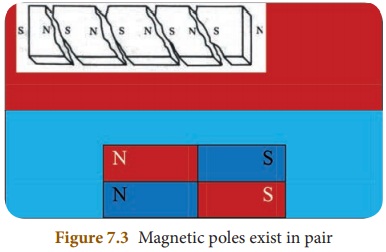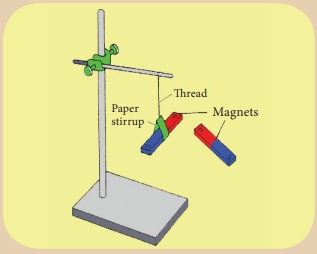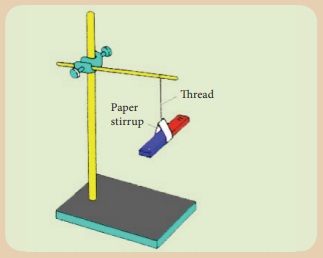Magnetism | Chapter 7 | 8th Science - Magnetic Properties | 8th Science : Chapter 7 : Magnetism
Chapter: 8th Science : Chapter 7 : Magnetism
Magnetic Properties
Magnetic Properties
The properties of a magnet can be
explained under the following headings.
* Attractive property
* Reflective property
* Directive property
1. Attractive Property
A magnet always attracts materials
like iron, cobalt and nickel. To understand the attractive property of a magnet
let us do an experiment.
Activity 1
Take some iron filings
in a paper and place a magnet near them. Do you see the iron filings being
attracted by the magnet? In which part of the magnet they are attracted?

Answer: The iron filings are attracted near the ends of the magnet.
These ends are called poles of a magnet.
Conclusion
: This shows that the attractive property of a magnet is more at
the poles.
You can observe here that the iron
filings are attracted near the ends of the magnet. These ends are called poles
of a magnet. This shows that the attractive property of a magnet is more at the
poles. One pole of the magnet is called the North Pole and the other pole is
called the South Pole. Magnetic poles always exist in pairs.
What happens when a bar magnet is
broken into two pieces? Each broken piece behaves like a separate bar magnet.
When a magnet is split vertically, the length of the magnet is altered and each
piece acts as a magnet. When a magnet is split horizontally, the length of the
new pieces of magnet remains unaltered and there is no change in their
polarity. In both cases the strength of the magnet is reduced.

2. Repulsive Property
Activity 2
Take a bar magnet and
suspend it from a support. Hold another bar magnet in your hand. Bring the
north pole of this magnet close to the north pole of the suspended magnet. What
do you see? The north pole of the suspended magnet will move away.

Answer:
Inference : This activity explains
repulsive property of a magnet that like poles repel each other i.e., a north
pole repels another north pole and a south pole repels another south pole. If
you bring the south pole of the magnet close to the north pole of the suspended
magnet you can see that the south pole of the suspended magnet is immediately
attracted
Conclusion
: Thus, we can conclude that unlike poles of a magnet attract
each other, i.e., the north pole and the south pole of a magnet attract each
other.ŌĆā
This activity explains another
property of a magnet that like poles repel each other i.e., a north pole repels
another north pole and a south pole repels another south pole. If you bring the
south pole of the magnet close to the north pole of the suspended magnet you
can see that the south pole of the suspended magnet is immediately attracted. Thus,
we can conclude that unlike poles of a magnet attract each other. i.e., the
north pole and the south pole of a magnet attract each other.
3. Directive Property
Activity 3
Suspend a bar magnet
from a rigid support using a thread. Ensure that there are no magnetic
substances placed near it. Gently disturb the suspended magnet. Wait for a
moment, let it oscillate. In a short time it will come to rest. You can see
that the north pole of the magnet is directed towards the geographic north.
Repeat the procedure a number of times. You will observe that the magnet is
oriented in the same direction.

Answer: The magnet is oriented in the same direction.
This experiment shows that a freely suspended bar magnet always
aligns itself in the geographic north-south direction.
Conclusion
: The property of a magnet, by which it aligns itself along the
geographic north-south direction, when it is freely suspended, is known as the
directive property of a magnet.
This experiment shows that a freely
suspended bar magnet always aligns itself in the geographic north-south
direction. The property of a magnet, by which it aligns itself along the
geographic north-south direction, when it is freely suspended, is known as the
directive property of a magnet. The north pole of the magnet points towards the
geographic north direction and the south pole of the magnet points towards the
geographic south direction.
Related Topics